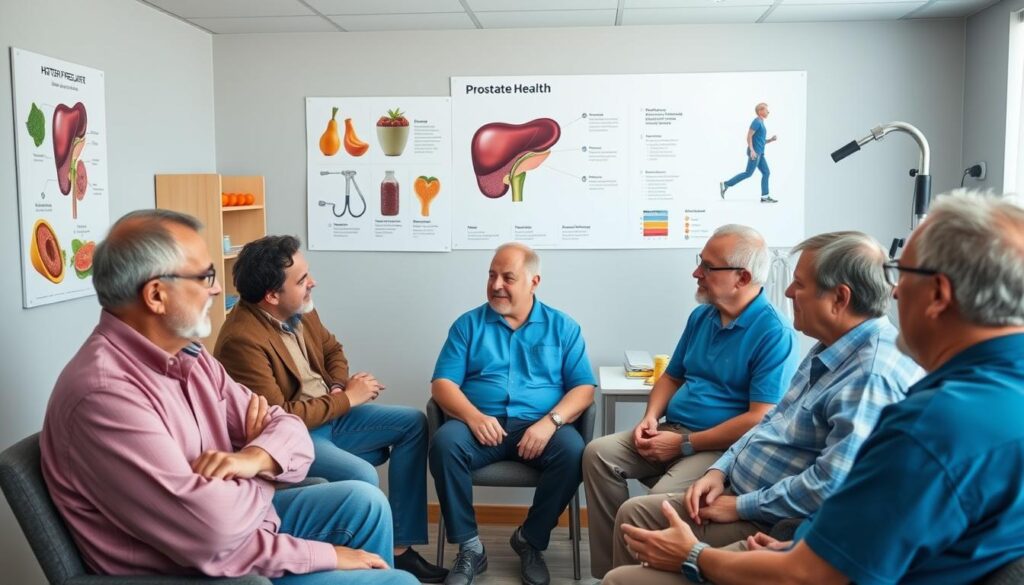Prostate Cancer Risks: Should You Worry at 40?
Explore whether you need to be concerned about prostate cancer risks as you approach 40 and learn about early detection and prevention strategies.

Are you thinking about prostate cancer risks as you turn 40? Many think cancer only hits older men. But, the truth is different. Prostate cancer is common, especially as men get older.
Knowing about these risks helps you stay informed. It also lets you take steps to keep your prostate healthy.
Let’s talk about prostate cancer risks as you get closer to 40. Knowing about early detection and prevention is key. It’s important for your health.
Key Takeaways
- Prostate cancer risks become more significant as you age.
- Understanding the symptoms of prostate cancer is crucial for early detection.
- A proactive approach to prostate health can reduce risks.
- Regular screenings are essential for timely intervention.
- Myths surrounding prostate cancer can hinder awareness and action.
Understanding Prostate Cancer
Prostate cancer is a big worry for many men. It starts in the prostate gland, which is key to a man’s body. This cancer can grow slowly or fast. Knowing about prostate cancer is very important.
What is Prostate Cancer?
Prostate cancer happens when cells in the prostate gland grow too much. This can cause tumors. Most men get it when they’re older, but younger men can too. Finding it early is key to treating it well.
Statistics on Prostate Cancer
Prostate cancer stats show how common it is. The American Cancer Society says almost 1 in 8 men will get it. Knowing these numbers helps us understand why we need to talk about it more.
Common Myths and Misconceptions
There are many wrong ideas about prostate cancer. Some think only old men get it, but it can happen to younger guys too. Another wrong idea is that all prostate cancer needs to be treated right away. But, some cases can be watched without rushing to treat it. It’s important to clear up these myths so we can all know the truth.
| Myth | Fact |
|---|---|
| Only older men get prostate cancer. | Prostate cancer can affect men of all ages, but risk increases with age. |
| All prostate cancer cases need aggressive treatment. | Some cases can be monitored without immediate treatment. |
| Prostate cancer is a death sentence. | Many men live long lives after successful treatment. |
| Sexual activity affects prostate cancer risk. | No clear link exists between sexual activity and prostate cancer risk. |
Prostate Cancer Risks: Should You Worry at 40?
As you get closer to 40, knowing about your health is very important. The link between age and prostate cancer risks is key. Most prostate cancer cases happen in men over 50. But knowing the signs early can really help your health.
The Importance of Age in Prostate Cancer Risk
Age is a big deal when talking about prostate cancer risks at 40. While it’s less common in younger men, the risk goes up in your 40s. It’s crucial to talk to your doctor about your prostate health often. Knowing about early detection can help manage risks better.
What to Watch For: Early Signs and Symptoms
Spotting early signs of prostate cancer is important. Look out for:
- Difficulty urinating
- Blood in urine
- Discomfort in the pelvic area
These signs might mean there’s a problem. Talking to your doctor about them can help catch issues early. Being proactive at this age can help keep you healthy.
Prostate Health and Prevention Strategies
Keeping your prostate healthy is very important, especially as you get older. Eating right, living healthy, and getting regular check-ups for prostate cancer are key. These steps can help prevent prostate cancer and find problems early, leading to a better life.
Diet and Lifestyle Choices for Healthy Prostate
Your diet is a big part of keeping your prostate healthy. Eating a balanced diet with:
- Fruits and vegetables, which are full of antioxidants
- Omega-3 fatty acids in fish like salmon and sardines
- Low-fat dairy products
Eating these foods can boost your health and lower prostate cancer risks. Also, staying active is crucial. Exercise helps keep you at a healthy weight, which lowers cancer risk.
Regular Screening: When and Why
Getting regular prostate cancer screenings is very important, especially if you’re over 40. These tests usually include a PSA test and a DRE. Finding cancer early can greatly improve your chances of recovery. Knowing when to start screening and following advice can help catch problems early.
Understanding Prostate Cancer Risk Factors
Knowing about prostate cancer risk factors helps you make smart choices. Important factors include:
- Family history of prostate cancer
- Age, as risk goes up with age
- Race, with African American men at higher risk
- Dietary habits that may affect cancer risk
Being aware of these factors lets you take steps to prevent prostate cancer and stay healthy overall.

Importance of Early Detection
Finding prostate cancer early can greatly improve treatment results. Knowing how screening works and the guidelines helps you take care of your health. Many don’t know the benefits of early detection. These benefits can change treatment options and outcomes.
How Screening Works
Screening for prostate cancer often includes a PSA blood test and a digital rectal exam. The PSA test checks for a specific antigen from prostate cells. High levels might mean cancer, leading to more tests. Regular checks help track changes, which is key for early detection prostate cancer.
Prostate Cancer Screening Guidelines
Health groups suggest talking about screening with your doctor at 40. Your risk depends on family history and ethnicity. Those at higher risk might need more tests.
Benefits of Early Detection
The benefits of early detection go beyond just living longer. Early finding means more treatment choices. This could include less invasive methods or active surveillance. This leads to care plans that fit you best. Other benefits include:
- Improved survival rates
- Stronger treatment responses
- Reduced incidence of advanced cancer complications
- Increased quality of life during and after treatment

| Early Detection Benefits | Details |
|---|---|
| Improved Survival Rates | Patients diagnosed early have higher chances of long-term survival. |
| Broader Treatment Options | Early detection allows for less invasive treatment choices. |
| Lower Treatment Risks | Fewer complications and side effects associated with advanced cancer treatments. |
| Personalized Care | Treatment plans can be more effectively tailored to individual circumstances. |
Conclusion
As you get closer to 40, knowing about prostate cancer risks is key. It’s important to understand if you should worry. Knowing about prostate cancer helps you and your doctor make good choices.
Living a healthy lifestyle can help you stay well and lower your cancer risk. Also, knowing the early signs means you can get help fast. This keeps your prostate healthy.
By focusing on prostate cancer, you take care of your health. Going for regular check-ups and talking to doctors is very important. This way, you can find problems early and feel confident about your health.






